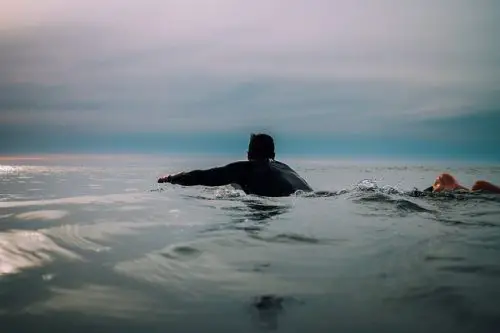One of the very many questions that this topic begs is, “is it possible for someone to stay warm in cold water?” sounds crazy right! To many, this may seem impossible, but this article seeks to address this issue and proffer valid and actionable solutions.
Depending on a person’s profession or activity that they are currently involved in, it could be a lifeguard, coast guard, tri-athlete, or someone who generally likes to swim every now and then. They are curious to know if there are ways to keep warm while in cold water and how to go about it.
Bringing a few things to mind, we would recall that water is a good conductor of electricity and by extension, if compared to air, it is seen to conduct heats away from the body twenty-five times faster than air. The reason behind this is because water has a greater density.
This explains why you lose body heat faster in water. If you stay long enough, your body temperature will drop leading to hypothermia and possibly death. Now that shouldn’t scare you, it is indeed possible to stay warm while you are in the water for whatever reason, be it for duty, competition or fun.
Body Temperature
Technically, normal body temperature varies from person to person. It is also dependent on certain factors, including the age of the person, activity the person is involved in, sex, food or fluid intake, the method of measurement, such as oral, rectal, or armpit readings as well as the time of the day.
The average normal body temperature usually accepted is 98.6°F. However, studies have also shown that the “normal” body temperature can have a wide range, invariably ranging from 97°F to 99°F.

The hypothalamus [1] is the portion of the brain that is responsible for the regulation of the temperature of the body. If by any chance after a temperature check, the temperature is observed to be more or less than 37°F mark, the hypothalamus momentarily kicks in to regulate the temperature to normalcy.
What Then Can You do To Stay Warm In Cold Water?
Don’t Just Dive In
I know you love water and will want to rush in as quickly as possible. But it’s advisable that you give yourself time to get acquainted with the cold first, therefore you have to resist the urge to dive in. Diving into cold water will come as a shock to your body and cause your body to go into shock, especially when you don’t know how cold the water is.
The best you should do is wade into the water gradually and slowly while your body gets used to that cold effect, then you can dive right in. You will have to get used to being in and around cold water. Prepare yourself physically and mentally.
For physical preparation try taking your bath with cold water more often and spend more time in the bathtub than usual. If you do this consistently for some time you will realize that your body will get comfortable with the sensation that comes with cold water.
Wear Appropriate Protective Gears
Protective gears that would help keep you warm while in cold water.
Drysuit
If you’ll be spending time in cold water swimming for fun, and in the process of having fun you want to keep water away from your skin i.e avoid water from touching your skin. Then a drysuit is your best option.
This is because it has a thermal insulation layer that helps you achieve this. If you also have plans of being in the water for a long period of time, then it is very much advised that you subscribe to and make use of drysuits as well.

Wetsuit
If, however, your plan is to temporarily get wet with water by just swimming on the surface of the cold water for a short period of time then you will need to opt for a wetsuit because it has the ability to trap heat in as a result provides insulation against water.
it comes in the form of a skintight suit. Note however that though you’ll be at liberty to easily move around as you normally would, this wetsuit would not keep you dry.
Neoprene Survival Suit
Wear a neoprene survival suit if you are going fishing in the ice or going camping in winter, or if you are likely going to end up in the water in freezing weather. It is also necessary for activities near-freezing water because it is heavily-insulated and can keep you warm in extreme environments.
The makeup of survival suit does not support swimming, its only meant to be worn when engaging in activities in close range with extreme temperature because it is highly insulated. On a brighter side, in order to avoid immediate shock if you decide to get into freezing water it’s important you use a Neoprene Survival Suit because it captures heat and resists cold.
Swimming Cap
In order to avoid heat loss, wear a swimming cap. Just like wetsuits, a swimming cap is also made with neoprene material. To make sure that heat is not lost at all, many swimmers layer their swimming cap by doubling it.

Gloves
You should probably go for neoprene socks and gloves if you have it in mind to go swimming in cold water because materials made with neoprene has the ability to conserve heat via preventing heat loss through feet and hands. These neoprene gloves and socks should be worn if they are not inbuilt into your dry, wet, or survival suit.
Earplugs
It is known that heat can be lost through the ears and to prevent this form of heat loss you need to make use of earplugs by simply plugging it into your ear. The entry of water into the ear should be avoided because of the ear’s apt sensitivity to cold water, it could cause ear pains. To avoid this, pop in some swimming earplug before going for a dive.
Glossary
- Health Line [Link]




